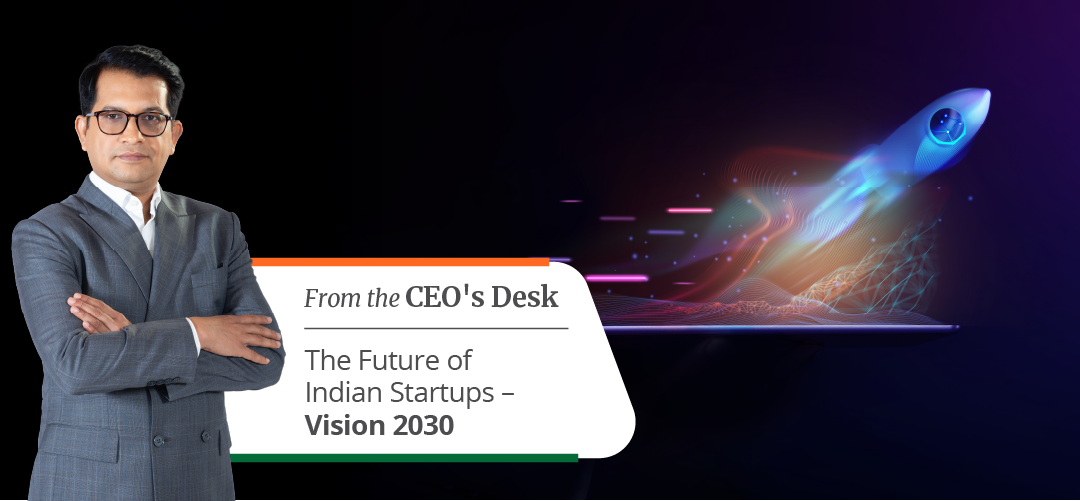
From the CEO’s Desk: The Future of Indian Startups – Vision 2030
by Admin | IITBOMBAY-WU
India's startup evolution is more than a success story; it’s a signal to the world. We’ve gone from fledgling ventures to becoming the world’s third-largest startup ecosystem. But as we look toward 2030, the question isn't whether we’ll grow; it’s how we'll grow and what kind of economy we’re shaping in the process.
For India to lead globally, we must think beyond unicorns and focus on building an innovation economy that is resilient, inclusive, and strategically aligned. That requires a shift from speed to depth, from valuation to value creation.
Where the Smart Money and Real Impact Will Be
Numbers impress, but depth wins. With over 100,000 DPIIT-recognized startups and 110+ unicorns, the surface looks shiny. But the real breakthroughs are emerging at the intersection of need, technology, and public good.
- HealthTech: Expected to cross $50B by 2030, this sector is moving from reactive care to predictive, AI-driven systems. Startups that integrate with government health programs and build for rural India will see outsized impact.
- AgriTech: The real innovation lies in connecting the unconnected soil sensors for small farmers, transparent marketplaces, and micro-credit platforms tailored for Bharat. This isn’t about disruption; it’s about enablement.
- Climate & CleanTech: With a $10T transition cost ahead, India needs climate solutions that are affordable and scalable. Carbon capture, energy storage, and local circular economy startups will be pivotal.
- DeepTech & Advanced Manufacturing: IP creation in semiconductors, defence technology, and quantum computing isn’t optional; it’s a sovereignty issue. Startups that build deep-tech for India, in India, will define our strategic future.
- Regional EdTech & Skilling: India’s youth boom needs targeted skilling. Platforms that go vernacular and prioritize employability, especially in non-metro regions, will own this space.
Founders Need More Than Grit. They Need Strategy.
2024 marked a bounce-back in startup funding with $8.7B raised. But the rules have changed. The funding winter taught us that growth without financial discipline is a mirage.
Founders today must go beyond product-market fit. They must master:
- Unit economics that work in good times and bad
- Regulatory fluency to navigate India’s evolving policy landscape
- Hiring for maturity, not just momentum
This is where experienced professionals, finance leads, legal experts, and ops leaders are crucial. The next generation of high-growth startups will be built by cross-functional teams that blend startup hustle with enterprise precision.
The Bharat Opportunity: Large, Untapped, and Misunderstood
Winning in Bharat means:
- Designing for low bandwidth, high trust
- Building regional language support from day one
- Creating pricing and product models rooted in daily realities
This is a massive opportunity for mid-career professionals to drive scale, especially in sectors like AgriTech, vernacular SaaS, mobility, and logistics. Deep operating knowledge is a competitive edge.
Success in 2030 Will Look Like This:
By 2030, success metrics will be measured less in valuation headlines and more in:
- Employment generated across Tier 2–4 towns
- IP ownership in AI, biotech, and advanced manufacturing
- MSME digitization through scalable B2B platforms
- Global Indian brands born in SaaS, DeepTech, and ClimateTech
Founders who align with these outcomes won’t just raise money; they’ll shape national direction.
Why India Needs Translational Leaders
The startup economy isn’t just for fresh founders. It needs systems thinkers – people who can connect business levers with regulatory nuance, product design with human behavior, and growth with governance.
The IIT Bombay–Washington University EMBA plays a key role here. It equips leaders not just to manage but to architect organizations that are adaptive, responsible, and future-ready. These aren’t just business degrees; they’re accelerators for nation-building.
The decade ahead won’t reward the loudest founders. It will reward those who can combine clarity of thought with depth of execution. Vision 2030 isn’t a distant dream; it’s a blueprint. Let’s build toward it, brick by strategic brick.